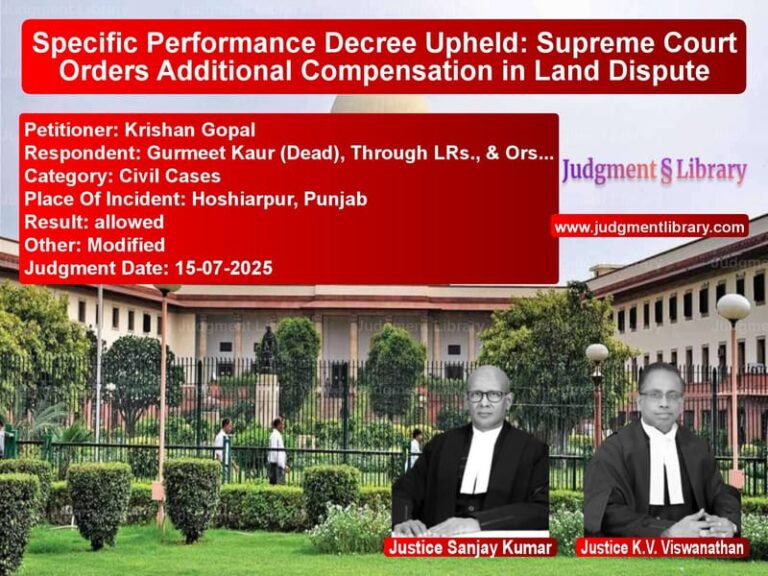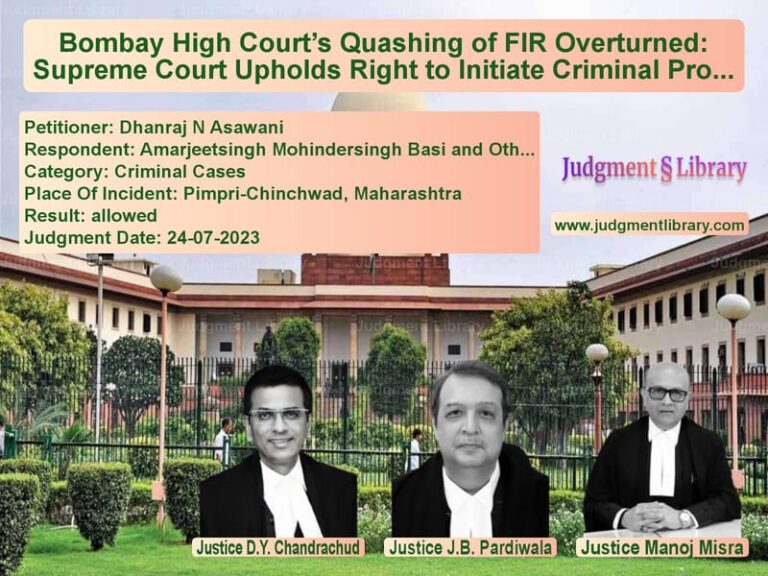Supreme Court Upholds High Court’s Decision in 36-Year-Old Murder Case, Alters Conviction to Lesser Offense
In a significant ruling, the Supreme Court of India dismissed the appeal filed by the State of Madhya Pradesh against a High Court judgment that modified the conviction of the respondents from murder (Section 302 IPC) to culpable homicide not amounting to murder (Part II of Section 304 IPC). The case, dating back to 1989, involved the killing of Laxman due to a violent altercation allegedly initiated by the respondents.
Background of the Case
The case originated from a violent dispute on November 1, 1989, in Madhya Pradesh. The prosecution alleged that the respondents, acting with a common intention, brutally assaulted the deceased, Laxman, and multiple other individuals. The primary allegation was that the respondents attacked the victims over a dispute regarding a buffalo tail-cutting incident. Laxman was severely injured, treated at a hospital, and later succumbed to complications 15 days after the attack.
Lower Court Proceedings
- Trial Court: The respondents were convicted under Section 302 read with Section 149 IPC and sentenced to life imprisonment.
- High Court: On appeal, the Madhya Pradesh High Court modified the conviction under Section 302 to Part II of Section 304 IPC, noting the long delay and the advanced age of the accused. The respondents were sentenced to the period already undergone (76 days) and fined Rs. 16,000 each.
Arguments by the Petitioner (State of Madhya Pradesh)
The State of Madhya Pradesh, through its counsel, argued:
- The assault was premeditated and involved multiple accused wielding deadly weapons, inflicting over 35 grievous injuries.
- The mere fact that the deceased died 15 days later should not dilute the severity of the crime.
- The High Court erred in modifying the conviction under Section 302 IPC, as the intent to kill was evident.
- Sentencing should reflect the gravity of the crime, and mere passage of time should not warrant leniency.
The State’s counsel submitted, “The respondents’ violent actions led to the death of Laxman. The punishment should be proportionate to the crime. Granting leniency merely due to the passage of time will send a wrong signal.”
Arguments by the Respondents
The respondents’ counsel countered:
- The medical evidence was inconclusive in proving a direct causal link between the injuries and Laxman’s death.
- The post-mortem report indicated that the cause of death was asphyxia, but no internal injuries or poison traces were found.
- The accused were all above 70 years old, and some were over 80 at the time of appeal.
- The High Court had correctly considered the long delay and imposed an appropriate punishment.
The respondents’ counsel argued, “The High Court rightly exercised its discretion. The accused have suffered the ordeal of trial for over three decades. Further incarceration serves no purpose.”
Supreme Court’s Ruling
The Supreme Court, comprising Justices Abhay S. Oka, Ahsanuddin Amanullah, and Augustine George Masih, dismissed the State’s appeal and upheld the High Court’s decision. The Court made the following observations:
“The medical evidence does not conclusively establish that the injuries inflicted by the respondents caused the death of the deceased. The passage of time and the nature of injuries create reasonable doubt regarding the applicability of Section 302 IPC.”
The Court emphasized that while justice must be served, it must be tempered with fairness, especially when dealing with cases where considerable time has elapsed.
Key Legal Takeaways
- Medical Evidence in Homicide Cases: Where medical reports fail to conclusively link injuries to death, courts may reduce the severity of charges.
- Sentencing Considerations: Courts may consider long delays and the advanced age of accused persons while determining appropriate punishment.
- Principle of Proportionality: Sentences should reflect both the gravity of the crime and the mitigating circumstances.
Final Judgment
The Supreme Court upheld the High Court’s order, dismissing the State’s appeal. The respondents were allowed to retain their sentence of time already served. The ruling reinforced the principle that prolonged litigation and advanced age of convicts could be considered in sentencing.
“Considering the passage of 36 years since the incident and the age of the accused, we find no reason to interfere with the High Court’s judgment.”
Petitioner Name: State of Madhya Pradesh.Respondent Name: Shyamlal & Others.Judgment By: Justice Abhay S. Oka, Justice Ahsanuddin Amanullah, Justice Augustine George Masih.Place Of Incident: Chhatarpur, Madhya Pradesh.Judgment Date: 20-03-2025.
Don’t miss out on the full details! Download the complete judgment in PDF format below and gain valuable insights instantly!
Download Judgment: state-of-madhya-prad-vs-shyamlal-&-others-supreme-court-of-india-judgment-dated-20-03-2025.pdf
Directly Download Judgment: Directly download this Judgment
See all petitions in Murder Cases
See all petitions in Attempt to Murder Cases
See all petitions in Custodial Deaths and Police Misconduct
See all petitions in Judgment by Abhay S. Oka
See all petitions in Judgment by Ahsanuddin Amanullah
See all petitions in Judgment by Augustine George Masih
See all petitions in dismissed
See all petitions in supreme court of India judgments March 2025
See all petitions in 2025 judgments
See all posts in Criminal Cases Category
See all allowed petitions in Criminal Cases Category
See all Dismissed petitions in Criminal Cases Category
See all partially allowed petitions in Criminal Cases Category







